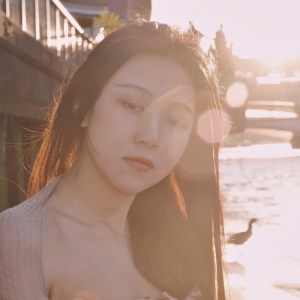by Wen Wen
The legendary sea surfaces
That meteoric stones have rolled over
An establishing shot, takes only one flash
Thinking of you, murmuring to you,
Until some tears run dry, turning reddish
Dipping upon a dream (many nights)
Once thinking of you, she is
Across the water of no name
Looking out the way back to you, she is
Still writing in English (how?):
‘Travelling around the world
From the opposite direction will she get to you’
‘Staying beside you for unnecessary
Seven weeks, two months, in any clockwise swirl’
‘Not coming to you. In a better position
Being stranded equates to floating.’
Disturbing the storm, recognizing the language
‘I will be A_,N_, Y_, anywhere,’ they synchronize
She cannot run through all diasporic lands
Of clouds and swamps
Imagine: being thrown into your place –
Getting away, being called upon –
Melting down the steel rail burnt red, in the end
Mellower and mellower the distance one night (many times)
Regardless of waves and wind
The soft loose water sleeves come stroking her head
But deep down the lock
The flight in moments of mesh and thread
The shattered, dead, unwanted flock
Stalling for time, thinking of you
Note:
Since the outbreak of Covid-19 in 2020, Chinese international students all over the world continue to face difficulties when trying to return home. The Chinese government’s current zero-COVID policy, and its consequent lockdown and quarantine requirements, have made these returns even thornier than they were before. Take Chinese international students in the United Kingdom, for example: while a few have changed their plans and tried to remain in the UK, most still choose to brave the return journey, even when this may require multiple transfers throughout the trip. Students have also come up with various methods to cope with exorbitant airfares, including transiting through other countries like Singapore. One of my friends planned to travel to Thailand, stay there for two months, and see whether the price of air tickets became more affordable while there. My flat mate even applied to a university in Korea: ‘Then I can have a student visa to stay in Korea for a month. I will drop out afterwards and fly back home’ she told me. Even when considering the application and language course fees this would require, as well as living costs for one month in Korea, this would still cost significantly less than direct flights. In addition to this, students must consider Chinese ‘circuit breaker’ regulations, which allow for the cancellation flights at very short notice – and refunds can take a long time to process. Some students carefully study airline policies, compare the risks and costs of different routes, and become seasoned experts at ‘going back to China in a roundabout way’ (quxian huiguo); they jest by announcing they have attained a master’s degree in ‘going home’. This is true to some degree. Facing ticket scarcity and the constant risk of trip cancellations, students are learning about the expenditure approach, risk assessments, and even international politics. Sarcasm aside, it is amazing to witness the diversity of methods deployed by Chinese students as they attempt their return home. Many of them have turned to the Chinese social media platform Xiaohongshu to share their stories. ‘’It almost feels like a new academic subject to study for,’ one girl joked bitterly. Many young people have been trying hard to return to their homelands and their families, even while this process of translocation involves a great deal of emotional, physical, and intellectual labour. This is in addition to the large sums of money, and excellent health records, these moves often require; after all, one needs to be free from the virus, but also physically resilient enough to bear the extensive testing, transfers, and quarantines the system demands. The tangible implications of post-Covid travel for international Chinese students are complex and multifaceted, particularly given the recent spike in anti-Asian racism across the United States and other countries, as well as the classism and ableism that frames access to transnational mobility in the post-Covid era. Some students are already on their way home, while some are awaiting still.
A young ghost whose power comes from absolute femininity.
Her living is an oxymoron and her ‘haunting’ is a reading possibility. When she writes, she feels obliged to her cultural assets, in that Chinese lyrical poetics has a special acknowledgement of the fragile and the melancholic. She has her deepest love for the Chinese language that differentiates vastly from the logocentrism and the Enlightenment tradition of worshipping the ‘strong, reasonable and well-established man’. She is humble. She sings among the broken, the contaminated and the dead. She believes that the exclusiveness and abusiveness of rationality and utility is a kind of phallism, so she is doing poetry. Her sincerest reverence to the alternative power of sentiment, resilience and introspection, the power of a philosophy that the sad ones (in some ablest words, the weak ones) should be respected, be cared for, and be loved entirely.


